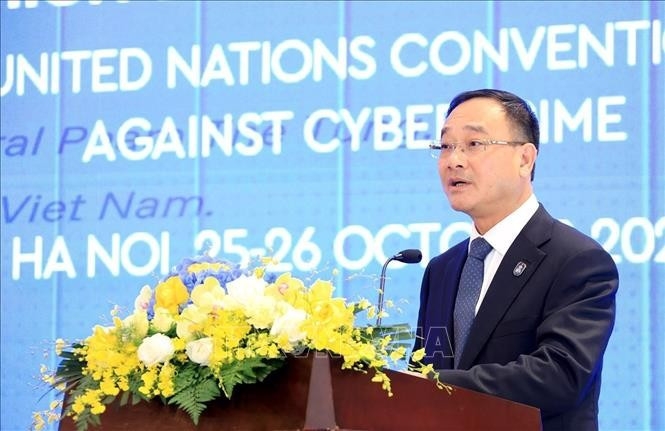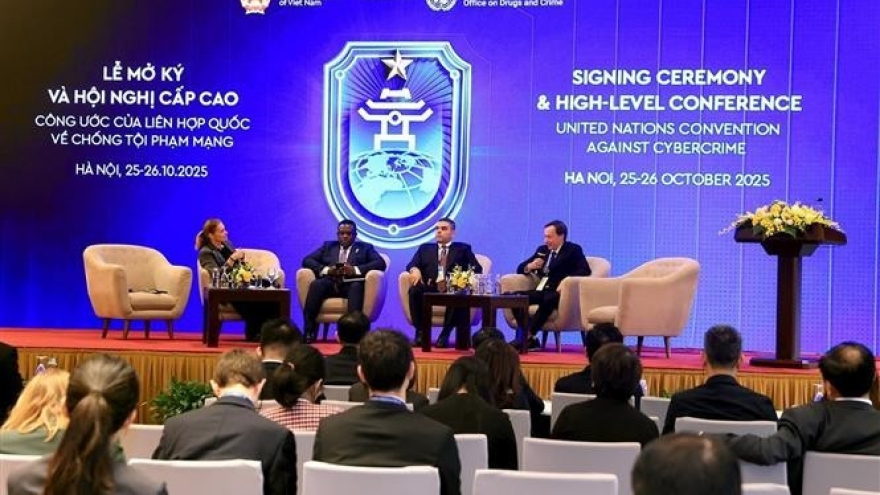Hanoi Convention: Fostering global cooperation in combating cybercrime
A policy discussion focusing on promoting international cooperation in combating cybercrime, with national approaches to implementing the United Nations Convention against Cybercrime (the Hanoi Convention), took place in Hanoi on October 26 on the sidelines of the convention's signing ceremony.

Co-organised by the Ministry of Public Security and the United Nations Office on Drugs and Crime (UNODC), the event was chaired by Neal Jetton, Director of Cybercrime at INTERPOL, and gathered representatives from numerous countries and international organisations.
In his opening address, Deputy Minister of Public Security Senior Lieutenant General Pham The Tung stressed that transnational crime continues to pose a serious threat to global security and sovereignty, with cybercrime emerging as a particularly dangerous challenge because of its borderless nature. He underlined that no single nation could tackle such crimes effectively without strong international cooperation and mutual support.
He noted that while global law enforcement collaboration has intensified, particularly within UN and INTERPOL frameworks, countries have still faced significant legal and procedural barriers.
He said the absence of a unified global legal instrument limited the effectiveness of cross-border investigations and prosecutions, as discrepancies between national legal systems often prevented offenders from being brought to justice.
In this context, the United Nations Convention against Cybercrime represented a landmark global framework to enhance cooperation in investigation, prosecution and prevention, said the Deputy Minister.
He underlined that for Vietnam, the convention offers opportunities to share data, electronic evidence and investigative experience with other nations, while also aligning domestic laws with international standards to promote a safe, transparent and responsible cyberspace.
Vietnam views international cooperation in preventing and combating crime as both an urgent and indispensable requirement for every nation today, he emphasised.
Tung affirmed that Vietnamese police had long maintained close cooperation with foreign law enforcement agencies, international organisations and private entities in preventing transnational and cybercrime, thereby contributing to regional and global security.
He anticipated that cybercrime would continue to evolve in complexity and proposed that countries expedite accession to the convention, integrate its provisions into national legislation, and apply them flexibly to enhance international collaboration.
Tung called for stronger public–private partnerships, noting that technology firms, banks, service providers and cryptocurrency exchanges held vital information that could serve as key evidence in criminal investigations.
Vietnam urges countries to regularly share experience and technologies for electronic evidence collection, establish specialised cyber emergency response centres, and strengthen training and capacity-building for law enforcement agencies, especially nations in need, he stated.
The official also emphasised the need for joint efforts to raise public awareness of cybersecurity, encouraging individuals and organisations to become the first line of defence in the digital space against increasingly sophisticated scams and data breaches.
Vietnam proposed that the UN and INTERPOL enhance their coordinating roles in information sharing, joint investigations, and capacity-building to bolster global responses to cybercrime.
Speakers at the session agreed that cybercrime has become a fast-evolving global threat, with common forms including online fraud, ransomware, child sexual exploitation, unauthorised image sharing and cryptocurrency-related scams. They also warned of the growing use of artificial intelligence to conduct more deceptive attacks.
The Hanoi Convention will serve as a crucial foundation for strengthening international cooperation, intelligence sharing and global resilience against these borderless threats, they affirmed.



